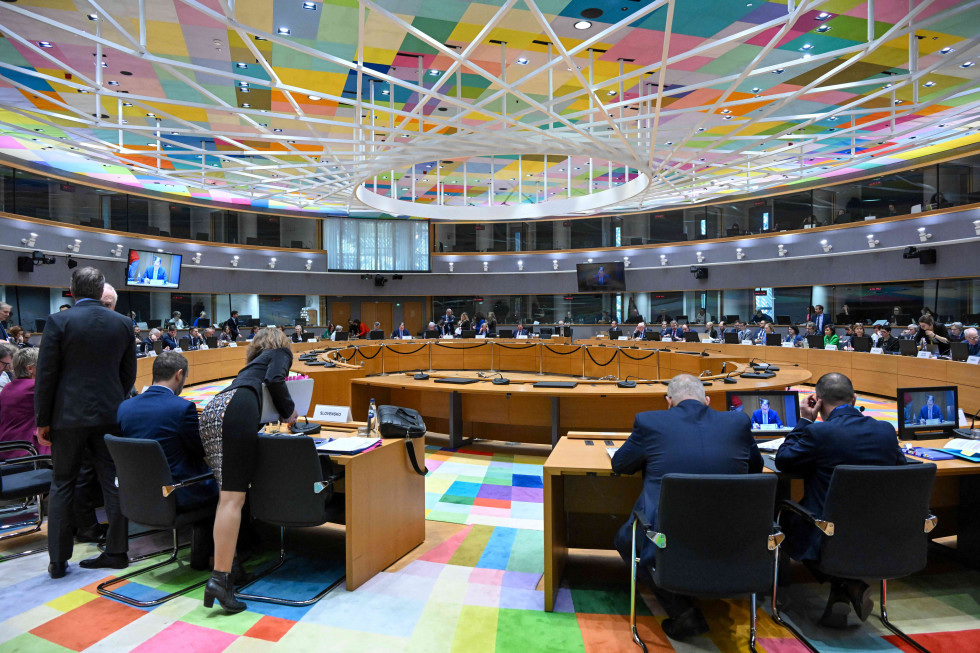A harmonised forest monitoring framework among the topics of the Agriculture and Fisheries Council
This is a highly important topic for Slovenia and forestry experts should be involved in the drafting of the proposal. State Secretary Eva Knez stressed, in the discussion, that forestry falls within the competence of member states and that any new obligations should not impose additional burdens.
Taking the helm of the Council of the EU in January, the Belgian Presidency started by presenting its work programme for the first half of the year. The Presidency will focus on ensuring food security and autonomy, and on further enhancing the sustainability of food production and consumption. Ministers took note of the situation in agricultural markets in the EU and discussed the preparations for the upcoming ministerial meeting of the World Trade Organization. They are in favour of strengthening solidarity lanes to ensure that aid reaches the Middle East and Africa. Numerous member states highlighted market imbalances concerning certain sensitive agricultural products, along with the associated price fluctuations, and the difficulties faced by national producers and processing facilities. With regard to trade agreements, member states insist that the same standards should apply in countries wishing to export to the EU to maintain competitive European agriculture.
Based on the information from the Commission, the Agriculture and Fisheries Council discussed the strategic dialogue on the future of agriculture in the European Union, which will be launched by the Commission on 25 January 2024. Its aim is to better understand the challenges and enhance cooperation in the sustainable adjustment of agricultural systems. Member states emphasise the importance of a timely and substantial discussion on the future common agricultural policy, which should provide solutions to the numerous challenges, including the green transition, food security and the resilience of agriculture amid climate change and crises that significantly impact agricultural markets and rural development. Numerous agriculture ministers noted that agriculture is committed to nature conservation and animal welfare, while stressing the objectives of food security and the need to ensure funds for the common agricultural policy. Slovenia considers that this dialogue is crucial for the sustainability of the common agricultural policy, paving the way for a competitive agriculture in the future. State Secretary Knez noted: "It is vital to involve all stakeholders in the process of shaping comprehensive and sustainable solutions. Preparations for the next programming period should start in time and should take into account the previous experience."
All ministers supported the initiative of the Czech delegation, highlighting that the introduction of the area monitoring system (AMS) causes numerous problems, requires more frequent on-the-spot controls and increases the administrative burden for the entire system of agricultural subsidies. Because the system increases the cost of administrative procedures, member states propose considering year 2023 as a trial year. Results from this period would, therefore, not be used as grounds for imposing sanctions.
Ministers also discussed a proposal to establish an EU-wide forest monitoring framework. The proposal aims to establish a harmonised and comprehensive system for reporting, monitoring and control, providing standardised data for all forests and other forested areas in the EU. Member states emphasised that many of them have been monitoring the situation in forests for many years, including at the international level. They propose to harmonise the systems and take into consideration long-term monitoring and data comparability. Slovenia stresses that this topic should be discussed in the Agriculture and Fisheries Council and that forestry professionals, with their knowledge and a comprehensive approach, should play a vital role in harmonising and enhancing forest functions. State Secretary Eva Knez pointed out: "Forest management planning and forestry fall within the exclusive competence of member states. Any new obligations should not impose additional financial or administrative burdens on member states and member states should maintain the flexibility of implementation." State Secretary noted that we should build on the existing national systems and introduce only those new technologies and indicators that have been proved to enhance forest monitoring.
On a proposal from Finland, the Presidency put on the agenda a discussion about the growing wolf population in certain areas where attacks on livestock occur regularly. According to many member states, the Alpine region is among the areas with rising wolf populations. Agriculture ministers aim to change the conservation status of wolves, calling for a better management of wolf populations. Slovenia emphasised regional cooperation and greater flexibility in applying exceptions to the Habitats Directive.
The Council also discussed cell-based meat production on the initiative of Austria. Slovenia agrees with Austria that a comprehensive assessment of the impact of such production and products is necessary, including implications for traditional production methods, the environment, and energy consumption. "Similar to genetically modified organisms (GMOs) and new genomic techniques (NGTs), a science-based approach and transparency in labelling such products are crucial to enable consumers to make informed choices," added State Secretary Knez.


